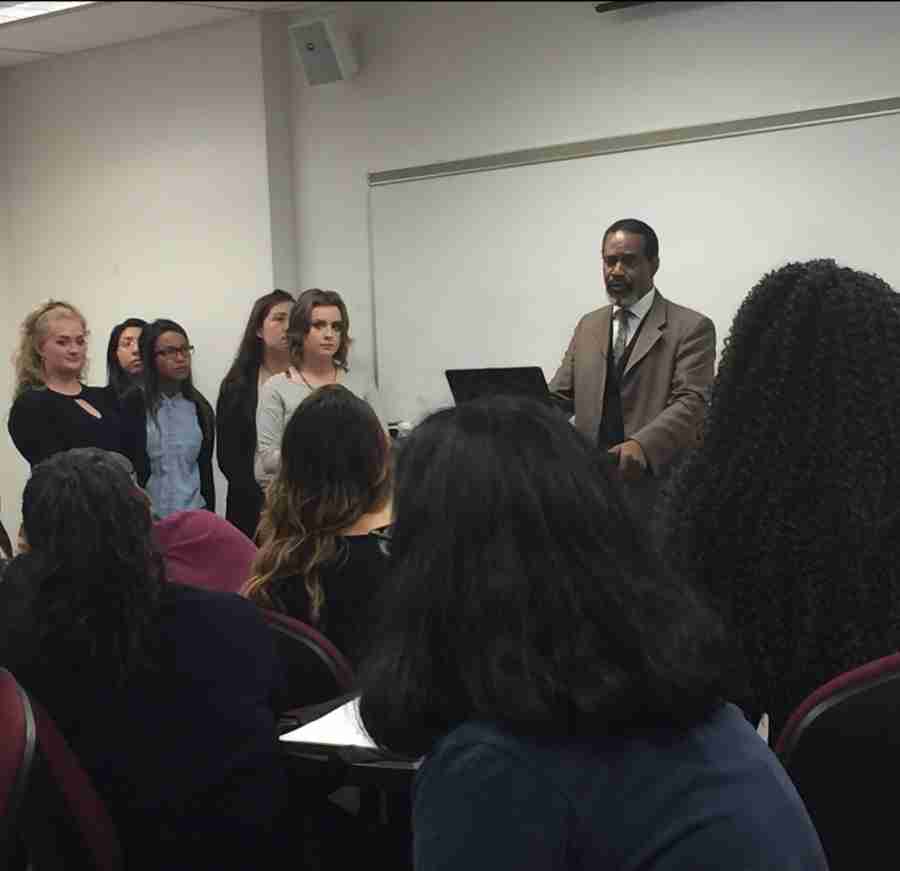Black History Month: Valencia Students Learn about African American Muslims
February 15, 2018
In honor of black history month Valencia hosted lecturer and counselor Imam Hatim Hamidullah for an open forum on Valencia’s East Campus from 11:00 am-1:00 pm Wednesday February 14 in Building 8. Hamidullah shared his story as an African American Muslim in the U.S. He explained of what it was like to be a minority, in a minority.
Muslim African Americans make up about only 1% of the overall African American population according Pewforum.org. Hamidullah shared the “untold stories” of African Muslims in this country. He discussed their history in this country, which started long before many may think.
“African Muslims have been in America since the 1400’s, there’s a community that’s been here that was established. Groundwork for Islam in America had already been laid,” Hamidullah stated.
The forum acknowledged several notable African American Muslims such as Janet Jackson, Akon, and of course Muhammad Ali, and Malcolm X. Several African American inventions, such as peanut butter, traffic lights, and plasma bags were also highlighted.
Hamidullah spoke about his original background growing up Baptist and how he converted to Islam.
“I was a bookworm. So, when I read the entire Bible, I wanted more, and I would have debates at Sunday school. Once I went to college I minored in comparative religion and this is when I came into contact with the Koran and more history of the Bible. I made a decision, even though I saw the golden thread of unity in all the religions. I made a decision to change my name and also my religion to change the history of what America had for my folks,” Hamidullah said.
Professor Dr. Qadri, who set up and hosted the forum, spoke on prejudice.
“I felt as an educator yes we have come a long way. But I also want to bring your attention to the fact that we still have a long way to go. We can still use subtle ways of discriminating people whether it’s in the job place, whether it’s giving that dignity to those who are marginalized,” Dr. Qadri said.
Hamidullah gave his response to recent hate crimes such as Charlottesville, and how this generation should respond to hate.
“Number one change it, number two if you can’t do that speak out against it, and number 3 pray from your heart and pray that it changes,” Hamidullah said.
Hamidullah explained how everyone can unify to extinguish prejudice and preconceived notions.
“Sometimes you can address a problem by going at it indirectly. Just be who you are, just be natural. Don’t look for prejudice in people,” Hamidullah said.
Brianna Trainor, student, shared what she thought of the forum.
“I thought it was very inciteful, I had known little to nothing about this community beforehand and now I feel I have a better understanding of the black community from this discussion,” Trainor said.
Professor Qadri spoke on why she decided to host a forum honoring the African American Muslim community.
“This is a very significant community that have made significant contributions and the more we talk about it the more people will learn and understand the community,” Dr. Qadri said.





Ibrahim • Feb 16, 2018 at 8:51 am
Did the Imam make no mention of the modern Islamic slave trade going on as we speak. Or did the Imam talk about the Muslim raiders who abducted and sold their fellow Muslims in the interior African tribes then transporting them to the coast for sale to the highest bidder. Most likely not.
The BBC Reports: http://www.bbc.com/news/world-africa-39567632
An IOM staff member in Niger said they confirmed the reports of auctions in Libya with several other migrants who had escaped.
“They all confirmed the risks of been sold as slaves in squares or garages in Sabha, either by their drivers or by locals who recruit the migrants for daily jobs in town, often in construction.
“Later, instead of paying them, [they] sell their victims to new buyers.”
Some migrants, mainly Nigerians, Ghanaians and Gambians are forced to work “as guards in the ransom houses or in the ‘market’ itself”, the IOM employee added.
The organisation has called the emergence of these markets “a disturbing new trend in the already dire situation for migrants in Libya”.